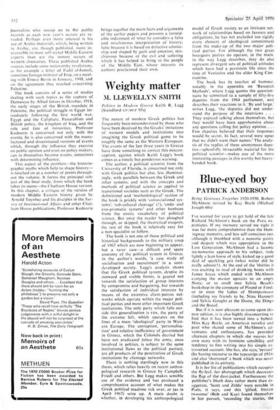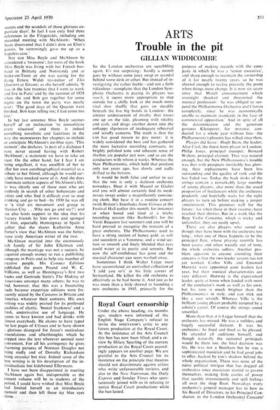Blue-eyed boy
PATRICK ANDERSON
Being Geniuses Together 1920-1930, Robert McAlmon revised by Kay Boyle (Michael Joseph 60s)
I've wanted for years to get hold of the late Richard McAlmon's book on the Paris ex- patriates. If my memory served me right it was far more comprehensive than the Hem- ingway memoirs, and less self-conscious too, although it throbbed with a neurotic gaiety and despair which was appropriate to the Lost Generation. McAlmon had a laconic no-nonsense approach to his subject, rode lightly a lean horse of style, kicked up a good deal of sparkling grit (what writer did he really admire?). At the end of the 'thirties it was exciting to read of drinking bouts with James Joyce which ended with McAlmon carrying the master upstairs to an angry Nora; or to stroll into Sylvia Beach's bookshop in the company of Pound or Ford; or to meet the ladies of Montparnasse (including my friends to be, Nina Hamnett and Sylvia Gough) at the Dome, the Dingo and the Boeuf.
But if it is now pleasant to come upon this new edition, is is also highly disconcerting to find that it has been turned into a hybrid. Miss Kay Boyle, an American novelist and poet who shared some of McAlmon's ad- ventures and enthusiasms, has provided alternate chapters in which she weaves her own story with its feminine sensibility and tendency to fine writing into his simple ex- troverted account. She has, she says, 'revised' (by having recourse to the typescript of 1934) and also 'shortened' a book which was never published in its entirety.
It is her list of publications which occupies the fly-leaf, her photograph which decorates the flap of the dust-jacket. Furthermore the publisher's blurb does rather more than ex- aggerate. 'Scott and Zelda' were notable in Paris, it says, and this 'gifted. literate twosome' (Bob and Kay) found themselves in hot pursuit, 'recording the stories, the
secrets and the scandals of those glorious ex- patriate days'. In fact I can only find three references to the Fitzgeralds, including one recorded meeting with McAlmon: When Scott discovered that I didn't dote on Eliot's poems, he sorrowingly gave me up as a hopeless case.'
Nor can Miss Boyle and McAlmon be considered a 'twosome'; for most of the book Miss Boyle was living with her French hus- band in Brittany and Normandy and at Stoke-on-Trent or she was caring for the dying Ernest Walsh (co-editor of This Quarter) at Grasse; as she herself admits, 'It was in the late twenties that I went to work and live in Paris' and by the summer of 1928 when she and Bob got together for some nights on the town the party was nearly over: 'The good days of the Quarter were finished, Bob kept telling me; I had come too late.'
In her last sentence Miss Boyle accuses herself of an inclination `to romanticise every situation' and there is indeed something novelistic and factitious in the way she manoeuvres her chapters to include or anticipate McAlmon's ice-blue eyes. 'This memoir', she declares, 'is part of a dialogue I have never ceased having with Robert McAlmon', a statement we have to take on trust. On the other hand, for I fear I am being ungallant, it was unselfish of her to offer her own autobiographical material as a tribute to her friend, although he would cer- tainly have mocked some of it. And she does illuminate certain aspects of McAlmon's life; he was clearly one of those men who are restlessly in search of other bohemians and artists and who find it difficult ever to stop drinking and go to bed—by 1930-he was off to 'a vital art movement and group in Mexico City . ..Why not go and see?'; and she also lends support to the idea that his literary friends let him down and sponged off him, especially Hemingway in Spain. I gather that she shares Katherine Anne Porter's view that McAlmon was the better, more truly American writer of the two.
McAlmon married into the enormously rich family of Sir John Ellerman and, although the marriage was not a success, he acquired enough money to run a publishing company in Paris and to help any number of creative people. His Contact Editions published the poets Pound and W. C. Williams, as well as Hemingway's first two books and Gertrude Stein's The Making of Americans amongst many others; he was to find, however, that this was a frustrating trade because expatriate editions were fre- quently seized by the Customs in Britain and America whatever their contents. His own writing was widely praised for its professed qualities of clarity, 'brutal frankness' and a fresh, underivative use of language. He seems to have known and had drinks with almost everybody. He claims to have typed the last pages of Ulysses and to have shown a glorious disregard for Joyce's meticulous emendations and afterthoughts which he Popped into the text wherever seemed most convenient. For all his astringency he gives charming pictures of Norman Douglas not being stuffy and of Dorothy Richardson being oracular but nice. Indeed some of the best writing is in his-description of the in- dividualistic but hidebound Ellermans.
I have not been disappointed in meeting McAlmon again but, indispensible as the Present volume will be to students of the period, I could have wished that Miss Bdyle had limited herself to an introductory memoir and then left those icy blue eyes alone.







































 Previous page
Previous page